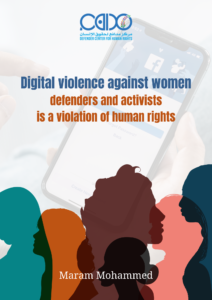Digital violence against women defenders and activists in Libya
Maram Mohammed
Legal researcher
It took decades of effort by women’s rights defenders (including both men and women) to persuade the international community and its organizations that violence against women constitutes a violation of human rights. This violence insults the inherent human dignity of women and threatens their lives and violates the basic human rights recognized by international documents and national legislation. Violence against women is one of the most prominent and widespread human rights violations because of the weakness of protection tools and the inadequacy of legal measures. The Commission on Human Rights condemned gender-based violence for the first time in 1994, and in the same year a special rapporteur on violence against women was appointed, yet many still deals with violence against women as a violation of human rights in the context of traditional patterns of violence (physical violence, sexual violence, psychological violence, …. etc.).
However, in recent years, with the increased use of information and communication technology, especially social networking sites, by women to express their opinions and advocate for their issues, the issue of violence against women in the digital space has emerged as a global phenomenon that has recently gained some attention on an international level, especially digital violence against women activists in the political and social fields, feminists, human rights defenders, and influencers in various fields. Women, especially activists, human rights defenders, and influencers, are using digital space to launch awareness and advocacy campaigns for many human rights and women’s rights issues, and the more they use these spaces, the more violent campaigns, incitement speech, and threats against them escalate. Libya was no exception, as it represents a favourable environment for the spread of digital violence against women in its various forms (extortion, threats, defamation, bullying, attack and cyber penetration), especially against women human rights defenders because they have succeeded in influencing the society through their presence in the digital space, and their engagement with prominent issues in the public sphere. A December 2021 report stated that Meta managed to remove 41 Facebook accounts, 133 public pages, three groups, and 14 Instagram accounts as a result of violating company policies. The report added that the network that leads those personal accounts and public pages originated in Turkey and mainly targeted Libya, and that the people behind those pages and accounts attack the rise of women in politics, society, and the media. This network has created pages that claim to be run by women public figures and deliver inflammatory speeches and messages on their behalf and then use other network pages to flag these posts to criticize them to encourage abuse and harassment of women.
In addition to what was stated in the report that those behind this activity are a network, it was clear to the activists that these campaigns were systematic. According to the human rights activist and journalist Nora Al-Jarbi, who was targeted by these campaigns, her exposure to a fierce online violence campaign coincided with many women from civil society and political activists being subjected to similar campaigns, which led many of them to suspend their activities in the digital space for fear that this violence would move from the virtual space to the real space. The threats they received were not individual and did not target them personally, but also extended to threatening and defaming their family members.
Unfortunately, these groups were able to incite citizens and push them to engage in these campaigns, through comments or directing incitement and threatening messages to the accounts of activists and sharing publications on a large scale. Moreover, the inciting parties included some public figures, for example, the head of the Civil Society Commission in Tripoli, Mrs. Intisar al-Kulaib, appeared in more than one discussion panel on the Clubhouse and incited against women activists and human rights defenders, and she also used her Facebook page to same purpose.
The fact-finding mission’s June 2022 report confirmed that the mission reviewed “several threatening and defamatory messages received by female activists and public figures via WhatsApp, Clubhouse, Facebook, and Messenger.” It also reported “the existence of dedicated chat rooms on Clubhouse or Facebook pages impersonating activists and containing political provocative statements which could endanger their lives, especially in light of the polarization in the Libyan context.”
The testimony of the fact-finding mission on facts related to violence in the digital space against women, especially activists in its reports, indicates an increase in awareness of the danger and impact of violence against women at the international level. However, Libya is one of the countries lagging with regard to submitting its national reports and reporting on best practices and the promising measures that states submit each year to the General Assembly, the Human Rights Council and the Commission on the Status of Women, on the areas of investigation, prosecution and provision of services with regard to violence against women, as Libya has not submitted any national report on the Convention on the Elimination of All Forms of Discrimination against Women as a state party since 2009.
Although the United Nations Guiding Principles on Business and Human Rights oblige all states and all businesses to respect and protect human rights, many Libyan women shared with the fact-finding mission “their frustration that social media companies do not adequately monitor content. They also pointed out the need for social media platforms to include Arabic speakers among their employees, specifically people who understand the Libyan context and the Libyan dialect to understand the nature and seriousness of the threats against them”.
As for national policies and legislation, Libya lacks a law that protects women from violence in all its forms, and there are some general provisions in the Penal Code issued in the early fifties of the last century, but they did not prevent the exacerbation of the phenomenon of violence against women in recent times without punishment or legal deterrence. It is worth noting that a draft law was submitted to protect women from violence, and it was worked on by a committee of legal and human rights experts from civil society, which includes in its articles the protection of women from digital violence, but it has not yet been presented in the parliament sessions. In the context of legislation, it can also be noted that the House of Representatives ignored the draft civil society law submitted by a group of civil society organizations, which would have provided protection guarantees for male and female activists in Libya. Even Law No. 5 of 2022 on cybercrime, in addition to the many complaints that prompted human rights organizations, Libyan and international, to demand its abolition due to “its contradiction with the basic principles of human rights and Libya’s international obligations, and the absence of the principle of dialogue and partnership with the various actors and stakeholders when it was drafted.” To add to these drawbacks is that this law was born gender blind as it did not pay attention to digital violence against women.
The parliament’s indifference to the demands of civil society activists is matched by the indifference towards civil society on the part of some technology experts who provide digital assistance to victims of digital violence in general. In a strange scene, Muhannad Al-Jaafari, head of the public communication department in the Libyan Network for Combating Cybercrime, announced the suspension of dealings with civil society institutions and organizations. According to Al-Jaafari’s statement, this decision comes “after provocations by some members of these organizations, the network’s team should not provide any assistance to these institutions and organizations. The follow-up department of the Libyan Network also announced that some members of the organizations used some pages on Facebook to spread false news.” This reflects the negative perception prevailing among some Libyans towards civil society, especially women activists.
However, the absence of a law that protects women in general or a law that provides guarantees for the protection of human rights defenders, as well as the absence of a special provision that criminalizes digital violence against women as an electronic crime, is not an excuse for the Libyan authorities to evade their responsibility to protect individuals even in the digital space. This is because Libya has ratified the International Covenant on Civil and Political Rights, which binds all parties in accordance with Article 17: “1- No one shall be subjected, arbitrarily or illegally, to interference with his or her privacy, family affairs, home, or correspondence, nor to any unlawful attacks campaigns on his or her honour or reputation. 2- Every person has the right to the protection of the law against such interference or attacks.” Ratifying this requires the state to reflect this in its national legislation, and it is perhaps one of the main demands of human rights activists and women’s civil society organizations in Libya in the year 2022. In a vote conducted by the Gender Equality Section of the United Nations Support Mission in Libya on five issues to be the subject of the 16 Days of Campaign Combating Gender-Based Violence for the Year 2022 In Libya, 43% of the activists, who participated in the vote, chose to support the cause of addressing online violence and hate speech targeting women and girls and suggested that among the campaign messages on social media: “Women have the right to express their political opinions” and “calling on decision-makers to enact laws and regulations to protect women from online violence. This indicates the awareness of activists and women’s civil society organizations of the danger of violence in the digital space and its effects not only on women’s lives, but also on their families and communities.
However, the awareness of activists and women’s civil society organizations of the danger of this phenomenon is not enough to reduce and eliminate it. Rather, a series of measures must be taken, perhaps the most important of which are:
– Launching awareness campaigns that send a clear message that digital violence against female activists is a violation of human rights and is a crime, while mobilizing the efforts of female civil society activists to launch counter-campaigns to confront campaigns of violence against them.
– Mobilizing efforts and advocating with the legislative authorities to adopt legislation that provides protection for women, male and female activists, as well as with the executive authorities with service providers (telecommunications and technology companies) and reminding them of their legal and moral obligations towards human rights.
– Building the capacities of service providers and cybercrime offices under the Ministry of Interior by mainstreaming a gender perspective in dealing with reports of cases of digital violence against women.
–
Digital violence against women defenders and activists is a violation of human rights
Maram Mohammed
Legal researcher
Digital violence against women





Leave a Reply
Want to join the discussion?Feel free to contribute!